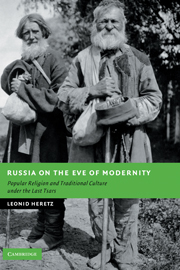Book contents
- Frontmatter
- Contents
- Acknowledgments
- Introduction
- 1 The traditional worldview
- 2 The Old Believers: modernization as apocalypse
- 3 The sectarians: dualism and secret history
- 4 Folk eschatology
- 5 The assassination of Alexander II (1881) and folk Tsarism
- 6 The year of famine and cholera (1891–1892): demonization of the nobility
- 7 The Japanese War: peasant Russia and the wider world
- 8 1905: revolution or reaction?
- 9 The Great War and the crisis of the traditional culture
- Epilogue
- Bibliography
- Index
- NEW STUDIES IN EUROPEAN HISTORY
9 - The Great War and the crisis of the traditional culture
Published online by Cambridge University Press: 23 December 2009
- Frontmatter
- Contents
- Acknowledgments
- Introduction
- 1 The traditional worldview
- 2 The Old Believers: modernization as apocalypse
- 3 The sectarians: dualism and secret history
- 4 Folk eschatology
- 5 The assassination of Alexander II (1881) and folk Tsarism
- 6 The year of famine and cholera (1891–1892): demonization of the nobility
- 7 The Japanese War: peasant Russia and the wider world
- 8 1905: revolution or reaction?
- 9 The Great War and the crisis of the traditional culture
- Epilogue
- Bibliography
- Index
- NEW STUDIES IN EUROPEAN HISTORY
Summary
The First World War represents the great turning point in the history of the traditional Russian peasant culture. The participation of millions of peasant men in the war effort, their communications with home, as well as major developments of more local importance (most notably, the displacement of vast numbers of people in the Western regions of the Empire), broke down the barriers of the old, village-centered peasant worldview and brought a substantial portion of the peasantry into contact with a broader and unsettling modern world. The upheavals of the revolutionary and Stalinist periods have obscured the Great War in historical memory; nevertheless it, and not the revolution which grew out of it, was the decisive crisis of the traditional peasant culture. Peasant attitudes and behavior during the Revolution can only be understood in the context of the peasant experience in the First World War.
The First World War represents the massive intrusion of the modern, outside world into the traditional peasant culture. An examination of the ways in which the peasantry made sense of this intrusion can help us gain a better understanding of the psychological state which made the social upheavals of 1917 and the years immediately following possible. As we shall see in this chapter, the cultural process of the Great War involved the torrential infusion of ideas and information from the modern Russian/European civilization into the consciousness of the peasantry, which re- (or mis-)interpreted this flow of facts according to the categories of the traditional culture and thereby produced a confused and highly volatile mental condition.
- Type
- Chapter
- Information
- Russia on the Eve of ModernityPopular Religion and Traditional Culture under the Last Tsars, pp. 191 - 233Publisher: Cambridge University PressPrint publication year: 2008



